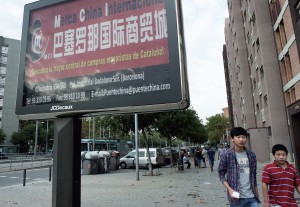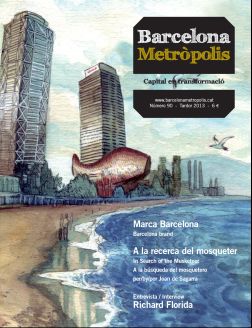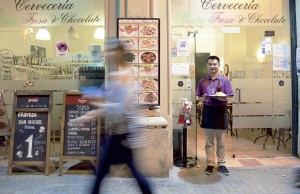The Chinese do not adapt easily to Catalan customs, but the economy goes a long way to facilitating integration. We share one trait: an enterprising spirit. Wen and Jenny, here on a visit, believe that the saying “Barcelona és bona si la bossa sona” [Barcelona is good if you have money in your pocket] could easily be one of those wise ancient Chinese proverbs.
I use Facebook increasingly less. Chinese censorship does not make things easy. But the other day, when I opened it to post some articles, I had a message from an old friend. It was Sun Wen who, from Hong Kong, was wondering if I would be in Barcelona in mid-September. She was in luck. It was La Diada (Catalonia’s national day), and I would be leaving my Oriental exile for three whole weeks. I could hardly wait!
Wen told me she would be staying in a hotel just off Rambla de Catalunya. She wanted to know if it was a good place to go shopping with her workmate. I told her that Passeig de Gràcia was a stone’s throw away, and that they would have a great time window-shopping on their way down to Plaça de Catalunya. She got quite excited, and on the strength of the friendship we had struck up when we both lived in Beijing, she asked me if I would have time to show them the city. I could hardly refuse. I love boasting about Barcelona when I’m abroad, but showing it to visitors, and seeing their reaction, is always a pleasure.
Then I asked her exactly what she wanted to do in the capital of Catalonia. In other words, what the word Barcelona meant to her. The little “new message” noise started to go haywire. Design. Good food. A city full of colours. Leather products. The beach. The Olympic Games… I did not recall having talked to her about leather or design (although I had touched on the beach and food), so I asked how she had picked up all this new knowledge about Barcelona. “It’s what I’ve read in magazines and what they say on TV,”, she said. I must admit that I was rather stunned. People talk more about Barcelona than I had imagined in China.
Beyond clichés
I was quite taken aback by Wen’s opinions. Normally, when you’re in China and you say the word “Barcelona” the old clichés are churned out. A few years ago it was bull-fighting and football. Now the golden game literally hogs the limelight. In all honesty, at first most Chinese only know these clichés. You can hardly blame them. If I ask someone from Barcelona what they know about Shanghai I get a lot of poker-faced stares. Everyone has seen the postcard with the Pudong skyline, but what do our locals really know about a city that is not even the capital of China? Very little, actually. Hardly anyone even knows that Barcelona and Shanghai are twin cities!
But as I said, football, and particularly Barça’s success stories, have been a very important showcase for the city of Barcelona in China. For example: in Beijing there is a Penya Blaugrana (Barça fan club) and a website set up by Chinese fans for sharing opinions, thoughts and comments on their favourite team. And the people of Beijing do not cultivate their love of football in their own company. They like to hang out with the “others”. That means us, the Catalans. It is through sports and contact with us – the exiles – that interest in the city and the country where the club hails from is increasing all the time. What begins with cheering Messi’s goals culminates in a strong urge to visit Camp Nou stadium (obviously) but also the Sagrada Família, Park Güell, the Olympic Ring, Les Rambles, etc. After a few months, a city which was little more than a football team for them has become something much more familiar.
At one of these Sino-Catalan soirées I had time to talk to Xiao Shan, the wife of a friend of mine living in Beijing. “I definitely want our child to be born and raised in Barcelona,” she said without a trace of hesitation. Xiao Shan has been to Xavi’s home three times and makes no attempt to hide her love for her mother-in-law’s flat in Barceloneta. Playing devil’s advocate somewhat, I remarked that Beijing was much bigger and more interesting. Barcelona and all its inhabitants and monuments could easily fit into a small neighbourhood in the Chinese capital. Still I failed to convince her. “Food and healthcare are better there,” she said self-assuredly. And she went on to say that although the locals are always complaining about their city, it is clean and unpolluted. She pointed to the smoggy sky: “I’ve never seen Barcelona look like that.” The Chinese simply drool at the sight of the blue skies of Catalonia. She has an advantage in this regard. She has already been in Barcelona, and she knows the virtues of her husband’s city.
I went back to thinking about Sun Wen and her impressions of the city and asked Xiao Shan what she knew about Barcelona before meeting Xavi. She became thoughtful. “Oh, now I remember! An aunt of mine was there for the Olympic Games and she said that people in Barcelona always kiss whenever they meet,” and she smiled. Of course, in China the double peck on the cheek greeting is not the norm. More than once I have landed myself in an awkward situation after kissing a girl who didn’t really know how to take it. Now Xiao Shan is used to the double-kiss and she also seems keen to get used to living in a city where children live with big dogs and do not have as much homework as Chinese kids, another two aspects that have grabbed the attention of this girl from northern China.
The Chinese in Barcelona

© Albert Armengol
An advertisement for the Merca China Internacional wholesale market at the entrance to Badalona from Sant Adrià.
When Wen and Jenny, her workmate, eventually arrived, they experienced some truly unexpected sensations. The weather was much better than in Hong Kong and people did not speak as much English as they had expected. One day, out for tapes in the neighbourhood of Sants, they realised that the owners of the bar were Chinese. After polishing off some croquettes and bread rubbed with tomato with ham on top, they were stunned to realise that the tapes had been made by their compatriots. I told them that while Barcelona did not have an actual Chinatown like London does, there was a lot of Chinese activity. When the demand for Asian cuisine seemed to be tapering off, the Chinese fearlessly began to buy up restaurants without changing anything in them. The fritters, calamari and patates braves (fried potatoes with spicy tomato sauce) are the same as the ones the previous owners used to make. The only difference is that the person doing the cooking has slanted eyes.
Although the Chinese are not the group that has adapted the most quickly to Catalan customs, the economy goes a long way to facilitating integration. The fact is that the Chinese and Catalans share one trait: an enterprising spirit. As they sip on their beer, I explain the saying “Barcelona és bona si la bossa sona” [Barcelona is good if you have money in your pocket]. They laugh and remark that it could easily be one of those very wise ancient Chinese proverbs.
Before we part, I ask them what they liked most about Barcelona now that they have seen it with their own eyes. Jenny says the outstanding food. If she knew the word, she might have said that she had “posat les botes” [stuffed herself] by nibbling her way around the city and trying everything from artichokes in batter to anchovies from the seaside town L’Escala. For Wen it is architecture. “I love the buildings. Not just Gaudí’s. My gaze just turns upwards on every street.”
After a week of work and tourism they returned to China. I reluctantly log onto Facebook again and see that they have posted a load of photos. The comments show that they are the envy of their friends. All of a sudden they all want to come to Barcelona.





